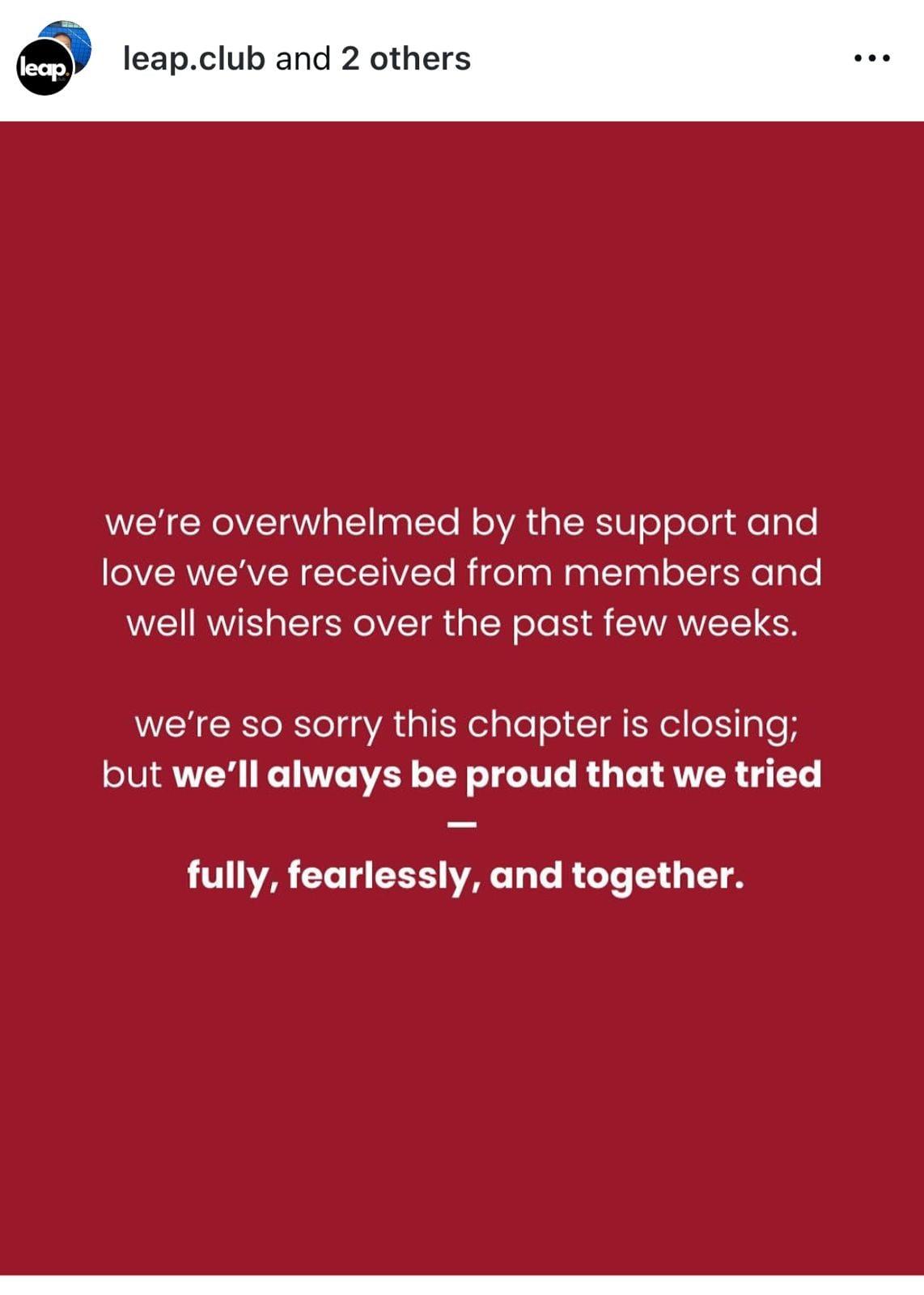leap.club said it is halting its operations due to a funding crunch and unit economics challenges
While the startup has decided to shut its offline centre in Mumbai, it would halt the operations of its online community and app by the end of this month
Founded by Ragini Das and Anand Sinha, leap.club is a community network with more than 25,000 working women members across the country
After raising $2.3 Mn since its inception in 2020, women-only community startup leap.club is halting its operations due to high customer acquisition costs and retention challenges.
The startup announced the decision operations on Instagram and LinkedIn.
“We would like to think we did many things right from a vibe, space, member experience and event programming pov, but here’s the hard truth: the numbers from an acquisition and retention perspective didn’t hold good,” the startup said.

As part of the decision, leap.club said it will close its offline club in Mumbai’s Bandra, which it inaugurated last year. Besides, it will halt operations of its online community and app by the end of this month.
“We’ve also had to take the tough decision to pause work on the online community and app by the end of May,” the company added.
The Beginnings & Early Success
Founded by former Zomato executives Ragini Das and Anand Sinha, Mumbai-based leap.club started operations with a “members-only” app, which connected women for events, workshops and conversations.
With the platform, the cofounders wanted to provide a supportive platform for women to have conversations, build professional connections, and get access to tools to improve their skill sets.
leap.club managed to onboard over 25,000 paid members over the years. The startup, which competed with the likes of women-centric career engagement platform HerKey and women’s community and marketplace startup Sheroes, raked in funding from the likes of Enzia Ventures, Artha India Ventures, Honasa Consumer founder Ghazal Alagh, Indifi’s Alok Mittal, and a host of other angel investors.
In one of her LinkedIn posts last year, Das said, “Through our platform, women have found their mentors, accountability partners, book clubs, coaches, colleagues, jobs, clients, sports and travel buddies, and above all – made (lots of) new friends.”
In 2023, leap.club went through a tech makeover and introduced new tools such as Circles (micro-communities), improved onboarding, universal search, enhanced profile pages, and smoother event booking. Besides, it hosted around 99 events in 2023.
leap.club’s Expansion Year
Following the strong growth in 2023, leap.club went into an expansion mode in 2024. It shifted its headquarters to Mumbai from Gurugram that year and also inaugurated its first physical community workspace in the country’s economic capital.
The offline workspace in Mumbai provided work stations, meeting rooms and curated experiences. Notably, leap.club was also looking to open another such physical workspace in Bengaluru.
In its “2024 wrap” blog, the startup claimed it onboarded 450 paid members for its Mumbai club and hosted more than 50 professional and social events.
However, the expansion was not without its share of problems. The startup said that it closed a funding round during the year, but it fell through at the last moment and did not materialise.
“We are pushing through some tough times and are operating in survival mode as a 10 people team. It’s hard but it’s also a chance for us to focus on what truly matters, and train harder to bounce back,” leap.club said.
The End Of The Journey
The failure to raise funding and an unclear business model seem to have led to the startup’s journey coming to an abrupt end.
The startup began operations with a call-based sales model, under which it onboarded members by engaging with them directly over a phone call. It onboarded the first 10,000 members in 2.5 years, but this model restricted the startup’s scalability options and led to “team fatigue”.
In 2023, leap.club moved its membership acquisitions completely online. However, this resulted in a temporary revenue crunch.
The challenges with the startup’s business model were also reflected in its financials. As per Tofler, its net loss zoomed 65% to INR 5.59 Cr in the financial year ended March 2024 (FY24) from INR 3.38 Cr in the previous fiscal year. Besides, its sales slumped 54.1% to INR 3.7 Cr during the year under review from INR 5.7 Cr in FY23.
The Struggles Of Social Media Networks
While announcing its decision to halt operations, leap.club said it will communicate with its members over the week. Besides, it will also initiate refunds for members who applied to join the community last year.
“We’re going to take time to pause, reflect, and figure out what the future could look like. Should we find leap.club a bigger home via an acquisition? we don’t know,” it said.
The startup’s move to halt operations has once again brought the spotlight on the struggles of community-driven networks or social media platforms in the country. Last year, microblogging platform Koo, which was once seen as an alternative to X (formerly Twitter), shut shop due to falling user numbers and failure to raise fresh funding.
Last month, “pseudonymous” social network Hood announced its pivot to become a match-making platform after raising a funding of over $3.2 Mn. Prior to that, Bella Vita founder Aakash Anand’s startup Unikon.ai, which offered an AI-powered networking platform, also pivoted to build a D2C brand citing high cash burn.









